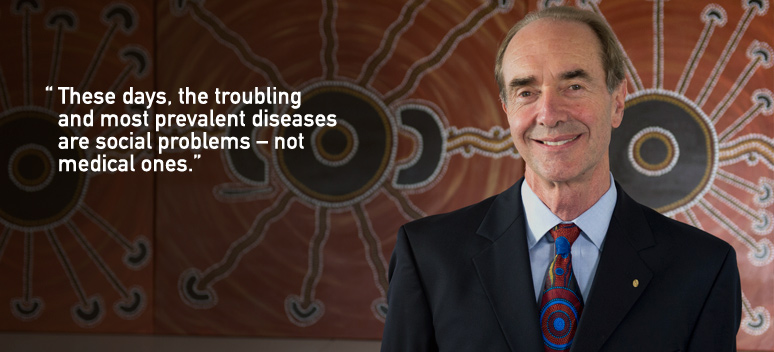Researcher Highlights
A snapshot of success
Professor Roger Smith
A self-described 'specialised zoologist,' Laureate Professor Roger Smith is keen on understanding the idiosyncrasies, interactions and inner workings of multiple animal species but especially human.

Laureate Professor Roger Smith is a man of many talents and interests. As the Co-Director of the University of Newcastle's Priority Research Centre for Reproductive Science, and the Director of the University's Mothers and Babies Research Centre and the Department of Endocrinology at John Hunter Hospital, he's also a man with many responsibilities. Not limiting himself to a singular field, the passionate academic freely studies "anything and everything" that sparks his intrigue.
"I don't' have a single focus," Roger elaborates.
"To give you an idea, I have about 25 different projects going at the moment."
"These range from explorations of potential new treatments for women in premature labour and women with postpartum haemorrhage, to the use of nanoparticles to treat thyroid and ovarian cancers."
"I'm very lucky to be able to do what I do."
A head start
Roger recalls having this affinity for the natural world from a young age. Working on the proviso that the "proof is in the picture," the esteemed educator tells of a photograph of his toddler-self feeding elephants, and its importance in kick starting his research career.
"I was thinking about how the planet works very early on in my life," he reflects.
"To me, all animals were, and continue to be, incredibly fascinating."
"Humans, however, I find most remarkable."
Seeking to satisfy this time-honoured thirst for knowledge about his own species, Roger studied medicine at the University of Sydney. Graduating in 1973, he spent the next two years at Royal North Shore Hospital followed by time in Western Australia and New Zealand, before undertaking a PhD at the University of London.
"I saw my training to become a doctor as training to become a specialised zoologist," he explains.
"My interest in people is not just in terms of their diseases, but also about how they interact with each other."
"We are the most highly social animal there is."
"This is the way I see myself and what I can contribute to our society."
After completing his doctorate in 1981, Roger returned to Australia and joined the University of Newcastle.
Well-known and well-travelled
Most recently, and perhaps most interestingly, Roger has been undertaking a research assignment on lemurs in Madagascar.
"They are surprising and extremely complex primates," he describes.
"The females are dominant over the males and their clitorises are bigger than penises, due to the different steroids produced during pregnancy."
"Oestrogen and progesterone normally regulate the onset of labour but they do all of these crazy things in lemurs so we don't yet know why they give birth when they do."
"People from the island's west coast have collected samples of poo from pregnant female lemurs and they've been transported here for analysis and comparison with samples obtained from Taronga Western Plains Zoo in Dubbo."
Spanning a generous handful of time zones, Roger's current work also sees him conducting work in Nepal. The clinical endocrinologist is on the hunt for ways to improve maternal mortality in the developing country, ambitiously and admirably looking to reduce its "exceedingly high" death rates during pregnancy.
"Women are of low standing in this culture," he points out.
Collaborating with a Nepalese postgraduate student, Roger is hoping to change this situation with a simple but powerful song.
"Music is a big part of day-to-day community life for these people," he illuminates.
"So we're going to run a competition in schools for a lyrical number that involves some key messages about respecting women."
"It will be judged by teachers – who are all male."
"Once the final song is chosen, it will be taught to travelling minstrels who will then sing it at every house in the intervention area."
"We will assess the impact of the song on attitudes to pregnant women and the care they need."
In our own backyard
Back home, Roger is endeavouring to 'close the gap' where Aboriginal health is concerned. He has set up programs in both Tamworth and Walgett, renting and renovating buildings for art and ante-natal research purposes.
"Indigenous women have double the rate of premature birth and double the rate of growth retarded babies," the multitasking scholar affirms.
"But we're trying to improve those statistics."
"We've employed Aboriginal artists and elders, as well as dieticians, midwives and lactation consultants to pass on their knowledge to expectant mothers."
"Together, they all sit down and do artworks and discuss their different areas of expertise."
Learning just as much from these women as he is by teaching them, Roger asserts the rural venture has so far been an "overwhelming success."
Thinking outside the norm
When asked where he would like to see the future of medicine and public health, Roger is quick to answer.
"They both need to change," he claims.
"These days, the troubling and most prevalent diseases are social problems – not medical ones."
"So I could tell you to eat less, start exercising and stop smoking, but then you go back to your world surrounded by family and friends who probably drink more than they should, smoke and don't exercise often."
"My five minutes with you is a waste of time."
Believing how we behave and think is "largely determined" by the people around us, Roger is calling for doctors to influence the social networks of individuals.
"I no longer meet with patients one-on-one," he reveals.
"If someone has obesity or smokes, for example, I want to meet their partner and friends and relatives."
"It's about group effort."
"After all, you can't refuse to help someone you love and care about."
Related links
The University of Newcastle acknowledges the traditional custodians of the lands within our footprint areas: Awabakal, Darkinjung, Biripai, Worimi, Wonnarua, and Eora Nations. We also pay respect to the wisdom of our Elders past and present.